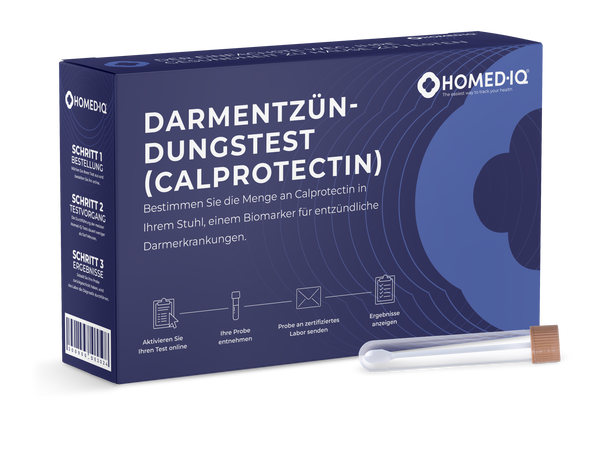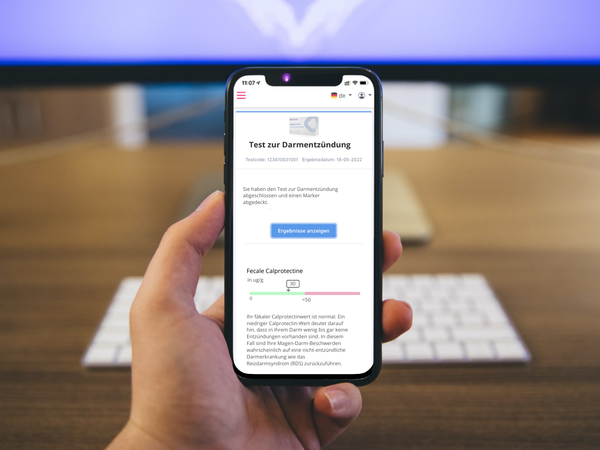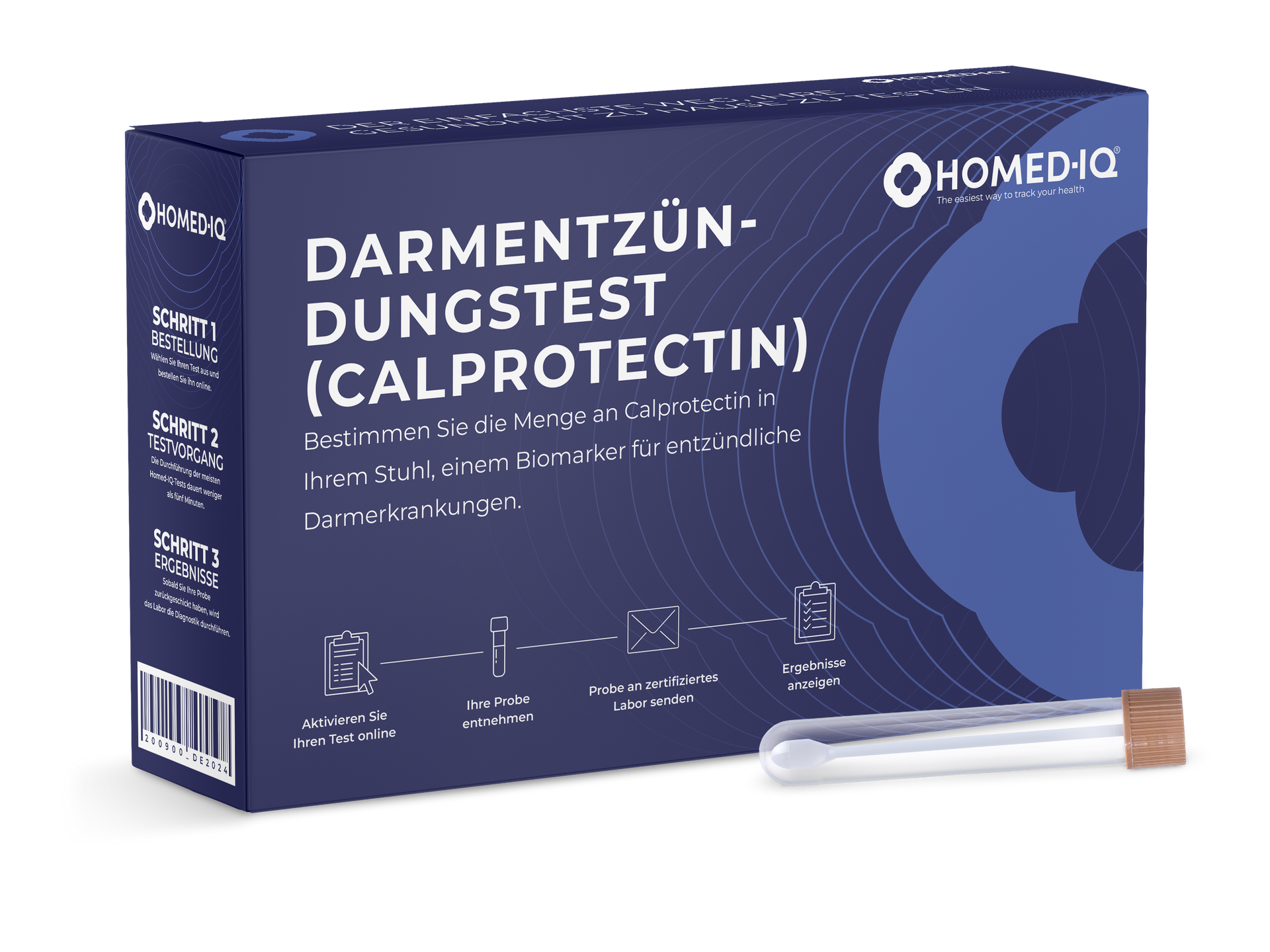Gut Inflammation Test
FREE SHIPPING TO
Gastrointestinal problems such as stomach pain, diarrhea, and fatigue are common and can affect up to 10-25% of the population in Western countries. These complaints can be uncomfortable and leave sufferers looking for the root cause. This test measures the level of calprotectin in stool, a protein that is released during intestinal inflammation. The result of this test can be used to help identify or rule out inflammatory bowel conditions, enabling appropriate follow-up testing and treatment.
Test mode:
Stool sample collected from home
How does a Gut Inflammation Test work?
This test measures the level of calprotectin in your stool. Calprotectin is a marker of intestinal inflammation and can be used to differentiate between inflammatory and non-inflammatory gastrointestinal disorders. Identifying whether there is inflammation in your gut can help guide appropriate follow-up testing and treatment.
How do I collect a stool sample from home?
Your Homed-IQ Gut Inflammation Test comes with everything you need to collect a stool sample from home. After collecting your sample, mail it back to our lab in a prepaid return-envelope. The lab will share your results with you within a few working days.
What is irritable bowel syndrome?
Irritable bowel syndrome (IBS) is a group of symptoms that affect your digestive tract. These symptoms include pain in the abdomen, gas, bloating and changes in your bowel movements, which may be diarrhea, constipation, or both. With IBS, these symptoms occur without any visible signs of damage or inflammation in your digestive tract.
What is inflammatory bowel disease?
Inflammatory Bowel Disease (IBD) is a term for diseases that cause long term (chronic) inflammation of the digestive tract. IBD is an autoimmune disorder, meaning it occurs when the body’s immune system mistakenly attacks the healthy cells in the digestive tract, causing ongoing inflammation and damage. While the exact cause of IBD is not fully understood, it’s thought to involve a combination of genetic, environmental, and immune factors. There are two main types of IBD: Crohn’s disease and ulcerative colitis.
- Crohn’s disease causes inflammation in the digestive tract. It most commonly affects the small intestine, but can also affect the large intestine or upper digestive tract.
- Ulcerative colitis causes inflammation and sores in the large intestine (colon and rectum)
Both Crohn’s disease and ulcerative colitis can cause abdominal pain, diarrhea, blood in the stool, weight loss, and fatigue. Symptoms can vary in severity from mild to debilitating and leading to life-threatening complications.
What is Calprotectin?
Calprotectin is a protein produced by our body as a response to inflammation. Inflammation is an immune response designed to protect your body from harm or potential invaders. The presence of calprotectin in feces can indicate that there is inflammation somewhere in the intestines. Intestinal inflammation can occur due to inflammatory bowel disease (IBD) or certain bacterial infections, and may cause symptoms such as stomach pain, diarrhea, and fatigue.
It can be difficult to diagnose IBD because its symptoms are similar to other common non-inflammatory bowel disorders, such as irritable bowel syndrome (IBS). Elevated levels of calprotectin in stool can indicate there is inflammation in the bowels, and can be used to distinguish between other non-inflammatory bowel disorders that cause similar symptoms, providing insight into appropriate follow-up tests or treatment.
What does the test result mean?
Low stool calprotectin levels mean that gastrointestinal symptoms are likely due to a non-inflammatory bowel disorder, such as IBS.
Elevated stool calprotectin levels indicate that there is likely inflammation in the intestines, but it does not indicate its location or cause. It is recommended to take the test result to your doctor for follow-up testing. This may include other blood and stool tests or an examination of the intestines for damage and signs of disease, such as a colonoscopy or sigmoidoscopy.
How soon will I receive my test results?
Once you have collected your sample and then mailed it to our laboratory, it generally takes a few working days before you receive the test result. As soon as your test sample arrives at the laboratory you will receive a notification by email. Once your test result is ready, you will receive a text message and an email from us with a link to your test result. We will therefore keep you well informed throughout the entire testing process!
What are the symptoms of inflammatory bowel disease?
The symptoms of inflammatory bowel disease symptoms vary depending on the severity of the inflammation and where it occurs in the gastrointestinal tract. Most people with IBD have periods of active illness followed by periods of remission, where no symptoms may occur.
Symptoms can vary in their severity and may include:
- Diarrhea
- Abdominal pain and cramping
- Fatigue
- Reduced appetite
- Unintended weight loss
- Blood in the stool
Who should use this test?
A calprotectin test is recommended for anyone experiencing gastrointestinal symptoms who would like to exclude inflammatory bowel disease as a potential cause. This test is also helpful for people who are already diagnosed with IBD and would like to monitor their inflammation levels over time.
What is the difference between IBD and IBS?
Inflammatory Bowel Disease (IBD) and Irritable Bowel Syndrome (IBS) are two distinct gastrointestinal disorders, although it can be difficult to distinguish between them. While both IBD and IBS can have similar symptoms, they are not the same and require very different treatments.
IBS is a syndrome, or group of symptoms. It can affect how the bowels function, making them work much more quickly or slowly than normal. Stress or eating a large meal can trigger IBS symptoms, which are often relieved by having a bowel movement. IBS can cause debilitating symptoms and significantly affect quality of life. However, it does not cause inflammation or damage to the intestines, meaning it does not appear on imaging scans of the colon. People with IBS rarely require hospitalization or surgery. Treatment for IBS can include medication, diet and lifestyle changes, and stress reduction techniques.
IBD is a disease characterized by long-term inflammation in the intestines. This inflammation can cause permanent damage to the intestines, meaning that it can be visible in medical imaging. Unlike IBS, IBD may cause blood in the stool, anemia, or weight loss in addition to diarrhea and abdominal pain. Treatment for IBD usually involves medication or surgery.
The prevalence of IBS is estimated to be between 10 and 25% in Western countries, while the prevalence of IBD is approximately 0.3%. Although IBD is less common than IBS, it requires prompt, specific treatment and is therefore important to test for and exclude.
How does it work?
Order your test
Fast and discrete letterbox delivery
Activate & take your sample
Video instructions included
Laboratory analysis
ISO - Certified lab network
Receive your results
Easy access through mobile




